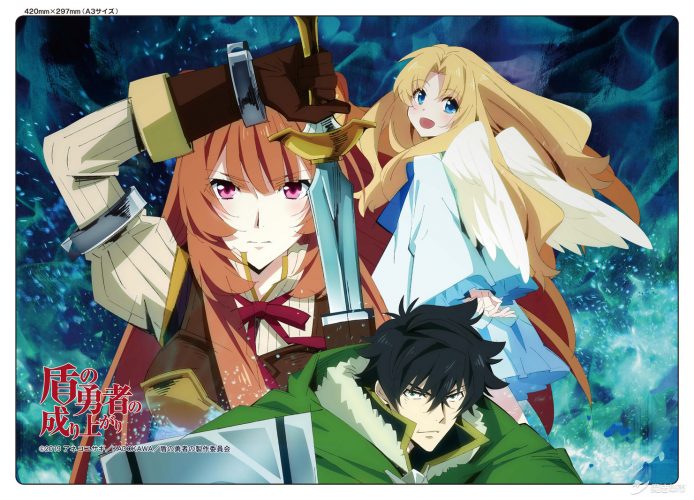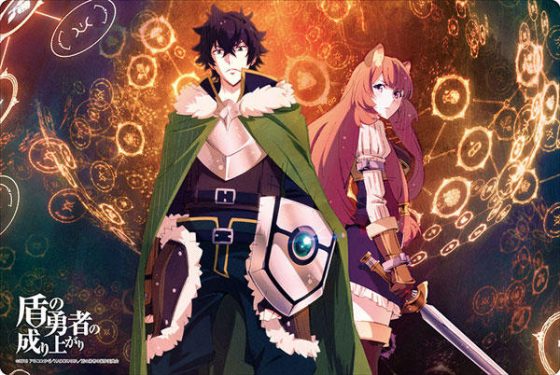
A Hero’s Tale of Redemption
- Episodes : 25
- Genre : Action, Adventure, Drama, Fantasy, Isekai
- Airing Date : January 9, 2019 – June 26, 2019
- Producers : Kinema Citrus
Contains Spoilers
Tate no Yuusha no Nariagari (The Rising of the Shield Hero) Introduction and Story
Naofumi Iwatani was just your average 20-year-old otaku who enjoyed MMORPGs. During a trip to the library, he finds a book about the Four Holy Weapons. Little did he know, he finds himself sucked into its world along with three other young men who happen to be from alternative versions of Japan. Naofumi is assigned to be the Shield Hero, whose information he could not find in the original book, but is IMMEDIATELY met with scorn and isolation.
Initially, Princess Malty is willing to join his party only to have him framed for sexually assaulting her. As a result, Naofumi is exiled from the party. Left with limited resources and money, Naofumi does what he can to level up with the help of Raphtalia and Filo in order to do their part in fighting off the Waves of Calamity, monster attacks that come every so often.

1. It Explores Prejudice
One of the themes we can take from this anime is how it teaches its audience about prejudice. We see that the Demi-humans are used as slaves, and are not acknowledged as living beings. Though Naofumi purchases Raphtalia as a slave to join his party, by no means does he treat her like one. Despite his initial cold nature around her, he feeds, clothes, and bathes and lets her freely play when they’ve got time to kill. Eventually, he comes to see her as a little sister/daughter, and genuinely cares for her and is willing to put himself in harm’s way for her. As Naofumi meets more of the Demi-humans, you get to see the significance of his role in the series.
2. Naofumi’s Redemption
If anything is the heart and soul of this anime, it is Naofumi’s redemption. He never asked to be the Shield Hero, and he’s initially hated just for being that. Adding more fuel to the fire, everyone wants him dead because he’s falsely convicted of sexually assaulting the princess. As a result, he’s distant and has trust issues. If he has to do things for people, he demands compensation as collateral that they won’t stab him in the back, or take advantage of him. Eventually, his relationships with his party members and being beloved by the Demi-humans gives him the opportunity to find his place in his role, and redemption.
3. Strong Supporting Cast
If there’s anything that sucks you into this series, it’s certainly its supporting cast with Raphtalia and Filo. Thanks to Naofumi treating them as equals despite his negative outlook and how they’re introduced, they were there to remind him of his positive qualities and that he is valuable to them and vice-versa. Thanks to his positive influence on them, they stick by him no matter what trials or tribulations that try to separate them.
1. Over-Saturated Genre
As we briefly shared, we can’t overlook that there are so many Isekai anime these days to the point that everybody and their mama has seen one. Some audiences might be sick of it and despite how we can say it has its own distinguishing qualities, those that have come to dislike the genre without any compromise, may still avoid it. Not only is it just merely an Isekai but an Isekai where fantasy J-RPG elements come into play, and that has already been done before as well.
2. Naofumi’s Situation and Demeanor
We have seen on some sites and message boards that SJWs don’t like how Naofumi is sympathetic due to the false accusations towards him, and some people (meaning SJWs) think that this plot point does nothing more to discredit actual sexual assault. We have already shared in a previous article on the notion of false allegations as it relates to this series, but in this review, we can’t help but briefly bring it up again. Some viewers can’t find themselves sympathizing as a result of the believe survivors mentality. We’re not telling anyone to not believe survivors, but on the same token, we should also believe in due process.
3. Can Be Interpreted as Misogynistic
Eventually, (spoiler alert) Naofumi does get his redemption, and the way he handles it and collects his debts can be interpreted as misogynistic. There are some people who don’t believe that false accusers should not be legally liable and the way Naofumi “punishes” Malty for her false accusations will (probably) be offense to those who share that mentality.
Final Thoughts

Considering that this anime debuted on the heels of the Brett Kavanaugh scandal, we can understand why people can be turned off by the plot points of Naofumi in this series. Honey’s Anime condemns sexual assault, but on the same token, we have to believe in due process, and innocent until proven guilty. Granted this anime isn’t for everyone though that may be for reasons that are more political in nature. All we can say to conclude is that the final act is excellently written and has great plot twists that keep you hooked. With that ending, hopefully we can get more installments.






